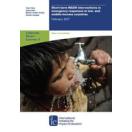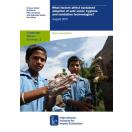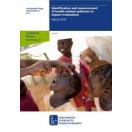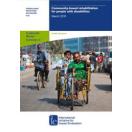
Short-term WASH interventions in emergency responses in low- and middle-income countries
3ie Systematic review summary 8
This is a summary report of a full systematic review that synthesised evidence on water, sanitation and hygiene (WASH) interventions implemented in the first 12 months of an emergency response. Evidence that WASH interventions reduce disease risk was limited, although reduced transmission risk through the use of chlorine in water was documented most often. There was clear evidence against pumping wells flooded with seawater. The review assessed how community perceptions and preferences affected the success of these interventions. Key factors included the taste and smell of water treatments, a preference for radio and face-to-face communication and ease of use. Five programme design and implementation characteristics were identified in the review as being associated with more effective programmes. They included timing, experienced staff, communication, community-driven engagement and linking development programmes to emergency responses.


